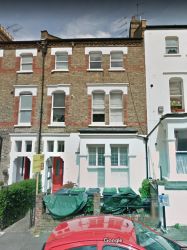For the centenary celebrations of women’s right to vote in the UK, Glasgow Women’s Library set out to once again take a closer look at famous suffragettes and tell their story but also to detect and unravel the life of less famous suffragettes. For research of this kind, we use books on the suffragettes but even more so old newspaper, we hunt for birth certificates and census reports and we keep our eyes peeled for photographs and artefacts. During my research for our project Vote 100 I stumbled upon one suffragette in particular: Pleasance Pendred.

In 1913, she was sent to Holloway prison for smashing windows of an antiquity shop on 167 Victoria Street in Westminster on the 28th January in the same year. She was sentenced to four months of incarceration and hard labour, starting in late February 1913. In prison, she went on hunger strike for at least two months. At some point after her first month of doing so, she was forcibly fed and suffered illness as a consequence. In the 04 Apr 1913 issue of The Suffragette, it is said that: “On her partial recovery, Miss Pendred who is still confined to her bed, continued the hunger strike, and is now being fed by cup.”. For this outstanding bravery, she received a hunger strike medal by the Women’s Social and Political Union (W.S.P.U.). A photograph of the hunger strike medal, engraved with her name, can even be found online. She did not serve her full sentence as she was released on the 30th April 1913 as is declared in the 09 May 1913 issue of The Suffragette, no reasons given. Further research reveals that she had been a teacher of the age of 48 (b. 1865) at one of the larger London schools for more than 25 years and that she had resigned relatively shortly before her window smashing. In the 04 Apr 1913 issue of The Suffragette, she expresses her special thanks to the Hornsey branch for the support and kindness she has received while being imprisoned. This suggests strongly that she was an active member for the Hornsey W.S.P.U. branch and also a habitant in the area. This suggestion is supported by the fact that she received a welcome picnic from the respective branch after her release as stated in the 11 Jul 1913 issue of The Suffragette.
In spite of these testimonies of her existence, there are no records about her before or after 1913. She does not appear in any census reports, there are no non-suffragette related articles about her, no birth or death certificates, nothing. This state of research started to boggle my mind. How could this be possible? What if she…
… changed her name to cover her political activism?
Just to see if my hypothesis may be right, I checked all of the documents I could find on her again. And, indeed, in one of her arrestment documents there was an intriguing detail: “Pleasance Pendred or Miss Jackson” was printed in one of the court records. Of course, Miss Jackson may be another nickname, too, but what if it was her, though? I went through all kinds of archives again on the hunt for a person fulfilling the following criteria: named Miss Jackson, born in 1865 (+/- 1 year), living in the London Hornsey area, working as a school teacher.
Research revealed that two women fulfilled the criteria I had commenced my second part of research with. Now there were only three possibilities to consider: a) it was the one person, b) it was the other person, or c) it was none of them (yes, this possibility could not be erased at this point). Then, I tried to find out more about the two women, hoping for a detail which would give me the decisive hint. Indeed, I did find it. One of the women was born Kate Pleasance Jackson. A great start but surely not enough to prove my hypothesis. Maybe deeper research into her family history would give me more clues in regards of the nickname. A marriage certificate of her parents revealed the impossible: the maiden name of Kate Pleasance Jackson’s mother was Pendred. And even more, Kate’s mother had a sister named Pleasance Pendred, born in 1843 in Rugby, Warwickshire, England. Pleasance Pendred, the sister, died at the age of 15 in 1858. Unfortunately, I could not find out the cause for her death but there are undeniable ties between the family’s history and the alleged nickname.

In 1901, Kate Pleasance Jackson is recorded at 46 Langdon Park Road in Highgate. Under the same address, she operated under the name of Miss Jackson as an active member of the W.S.P.U. until October 1912 according to the records. (October 1912 is set about three months before her arrest as Pleasance Pendred. And remember: she first appears as Pleasance Pendred AFTER quitting her job as a teacher in January 1913!)
She had been a collector for money and object donations for the Hornsey W.S.P.U. branch and remained such even during her time of imprisonment. From 1909 until 1910, she was also the Literature Secretary for said branch (renamed to North Islington in summer 1910). She resigned from this occupation early. In the 30 Sep 1910 edition of The Suffragette, it is said that this was so due to “circumstances”. For now, I have not found out what those circumstances were. After her release from prison in 1913, she continued to hold a few talks for her W.S.P.U. branch. She is last recorded as a speaker for the North Islington (formerly Hornsey) W.S.P.U. branch meeting in August 1913.
In her older days, she moved to Sussex and died in Lewes in 1948.
One of the most interesting details about Kate Pleasance Jackson and her alias Pleasance Pendred is that Kate not only took on her cover name for the period of her court trial and arrestment but instead during the entire time of her militant activism and thereafter. Furthermore, the cover name was accepted and used by her surroundings. Suffragette newspapers stopped writing about “Miss Jackson” and instead referred to her as “Pleasance Pendred” and even her defenders and testimonials of her good character (e.g. the principal of her old school and the local Reverend F.M. Green in the 14 Mar 1913 edition of The Suffragette) refer to her by her nickname. Finally, let us not forget about the engraving on her hunger strike medal: It clearly says Pleasance Pendred.
For future research purposes, her court trial may hold interesting potential. During her court trial, she not only revealed her deep admiration for Emmeline Pankhurst and her motives behind the deed she was convicted of but also the unacceptable conditions of women detained on Rochester Row. A transcript of the court trial can be found in an issue of The Suffragette (28 Feb 1913). Recounts can also be found in issues of the Leicester Daily Post (22 Feb 1913). She published a defence article named “Why Women Teachers Break Windows” in the Woman’s Press. A full copy of it can be found in an issue of the Daily Herald (25 Feb 1913). You can immediately access an excerpt thereof if you scroll down here to page 12. In an article from the 21 Feb 1913 issue of The Suffragette, it is suggested that other detainees such as Florence Hull and Margaret Haly also wrote about similar subjects. Hearing of the conditions for women detainees, the judge and the foreman declared their discontent and announced investigations. However, it is unclear whether these were ever put into practice.
SOURCES:
Berks and Oxon Advertiser. Issues: 28 Feb 1913.
Conventry Standard. Issues: 07 May 1958.
Daily Herald. Issues: 25 Feb 1913.
Director of Public Prosecutions. Case papers: Kerr and 8 others. 1912 onwards. P. 652.
Dundee Evening Telegraph. Issues: 21 Feb 1913.
Faringdon Advertiser and and Vale of the White Horse Gazette. Issues: 08 Feb 1913.
Leeds Mercury. Issues: 22 Feb 1913.
Leicester Daily Post. Issues: 22 Feb 1913.
The Suffragette. Issues: 24 Dec 1908; 07 May 1909; 27 May 1910; 17 Jun 1910; 24 Jun 1910; 01 Jul 1910; 08 Jul 1910; 15 Jul 1910; 29 Jul 1910; 05 Aug 1910; 12 Aug 1910; 26 Aug 1910; 16 Sep 1910; 30 Sep 1910; 25 Oct 1912; 07 Feb 1913; 21 Feb 1913; 28 Feb 1913; 14 Mar 1913; 21 Mar 1913; 28 Mar 1913; 04 Apr 1913; 18 Apr 1913; 25 Apr 1913; 02 May 1913; 09 May 1913; 11 Jul 1913; 18 Jul 1913, 01 Aug 1913.
Vote. Issues: 28 Feb 1913.
Votes for Women. Issues: 14 Mar 1913.

One reply on “Suffragette Talk: Who was Pleasance Pendred?”
Hi, not sure if you are still taking comments on this, but I am so thankful to you, the library and Jeanette Lang for uncovering the info about Pleasance Pendred. Kate Jackson was my father’s great aunt, my great, great aunt! I have been researching my family tree and came across your info. I am so grateful to you guys for hunting it out.